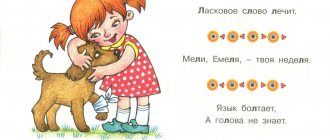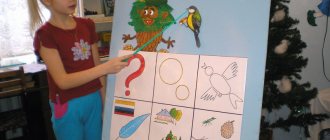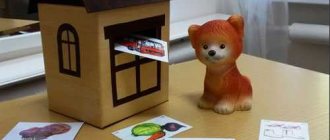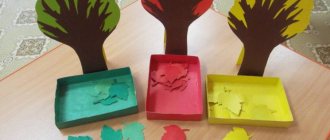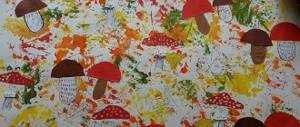Card index of games on the sound culture of speech (middle group)
Publicchenko Natalya
Card index of games on the sound culture of speech (middle group)
Middle group
Exercises to strengthen correct pronunciation and phonemic awareness
Goals: develop phonemic hearing, speech attention, speech breathing, consolidate the correct pronunciation of sounds and words. Material. Paper boat, 4 cm long; basin with water.
Exercise “Let the boat float on the water”
The basin is half filled with water. Each child, saying: “Fu-u-u”
, blows on the boat so that it floats from one
“shore”
to the other. The exercise is performed 2 times.
Game "Boat and Steamship"
The teacher divides the children into two groups : one group - boats , the other - steamers. Educator. When a boat floats on the river, you can hear: “Shoot, rustle, rustle.”
;
when there is a ship, you can hear “Tshuh, tpsh, tshuh” (children repeat
the sound combination ) .
At the signal “Boats are sailing,”
the first
group of children walks through the group and pronounces sound combinations : “Shukh, rustling, rustling,”
at the signal
“Steamboats are sailing,”
group performs the exercises .
Then the children change roles and the game is repeated. Train game
Educator. We will go to visit the bear and the bunny by train. I will be the driver, and you will be the trailers. The wheels are knocking: “Thump, thump, thump”
, the train hums:
“U-oo-oo” (children repeat
the sound and sound combination ) .
When the train arrives at the station (the chair on which the bear is sitting, he stops: “Uh-uh The bear gets on the train and goes to the bunny with the children!” Then the animals and children return to the group .
Game with tasks
The bear gives tasks to the children: “Walk around the room like me.”
“Growl:
“Hrp-hrp-hr
.
“Eat honey - lick it off your paw. lick your lips. teeth in a circular motion" (children perform tasks)
. Then the bunny gives tasks to the children: “I am a bunny, call me!”
coward. When I get scared, my tail sways from side to side. Show with your tongue how MY tail swings (the children, as the teacher shows, open their mouths wide and, without touching their lips, run their tongue from corner to corner of their mouth). I can jump, and you? (Children jump like a bunny.)
I hide behind a bush from the fox
(children crouch)
and breathe like this:
“Uh-uh-uh, uh-uh-uh-uh” (children repeat)
.
Game "Orchestra"
Educator. There are many musicians in the orchestra who play different instruments. And we will only play (on large and small drums.)
Each child is given a small and a large mug;
There are the same circles on the board. Educator. When you hit the big drum, it knocks: “Tam-tam-tatam”
;
in a small way - “Tyam-tyam-tytyam” (Children repeat
sound combinations 2-3 times .) - We play large drums (points to a large circle, the children raise the same circle and sing the corresponding song together with the teacher).
- We play small drums (points to a small circle, the children raise their mugs and sing another song). Then the teacher (freely)
points to the mugs, the children, lifting them, sing the necessary songs.
Exercise “Smell the flower”
Educator. All artists are given flowers. They also gave us a flower. It smells very good. Watch how they smell it (inhale through the nose, exhale without straining your voice and say: “Ah-h-h”
) .
Then the teacher approaches each child, and he repeats both actions. When everyone has smelled, the teacher invites the children to say the following phrase, first quietly, then louder: “The flower smells so good.”
.
Exercise "Training"
Educator: Today you will again become artists and play the pipe: “Doo-doo-dududu”
(children repeat
the sound combination 2-3 times ) . Let’s prepare for the performance: let’s puff out our cheeks strongly, as if we have two balls in our mouths
(demonstration)
.Then we’ll blow and say:
“Duuu” (repeat 5-6 times)
Game “Orchestra”
Educator. A doll and a bear will help us in the game. If I pick up the doll, the girls will play; if I lift the teddy bear, the boys will play; If I raise the doll and the teddy bear, all the artists - the whole orchestra - will start playing.
The teacher picks up the toys in random order, and the children perform the corresponding actions (9-12 times)
. At the end of the game, the doll and the bear praise the artists and clap for them.
Getting ready for school
Throughout first grade, children work on the ability to identify sounds in words. The school's educational and methodological complexes are designed in such a way that children reinforce this material. Therefore, a preschooler should come to class already prepared, knowledgeable and able to identify basic sounds.
Determining the number of syllables in a word
There are different games to determine the number of syllables:
- “If I meet a word on the road, I’ll break it into syllables” - a didactic game with a road map and cards with words;
- “Syllable ruler (an envelope with a ruler and circles, where the circles are parts of the word);
- “Words Lost” is a word game. The teacher says the word in a chant, and the participant must determine what kind of word is lost in these words: ma-ma-la-pa-pal-ka-li-sa, etc.;
- “Count the syllables” is a didactic game. The adult pronounces the word, and the children lay out counting sticks according to the number of syllables.
Important! The work should use different types of games. This will allow you to most fully develop your vocal speech skills.
Number of syllables in a word
Learning to speak quietly
Preschoolers rarely know how to control the volume of their speech, so the teacher’s work should correct this skill. The main games are:
- “Quiet-louder”: the participant says the same word first loudly, and then quieter and quieter;
- “Queter than a mouse - a cat on the roof” (outdoor game): children run chaotically and scream, then the teacher recites a poem, and the children must speak more quietly;
- “Go play with your dreams.” The teacher starts the game: “Now we’ll go for a walk. The weather is beautiful outside, so let's call our friends. Let's shout loudly: Hare, Fox!!! Go out for a walk!!! Oh, but the hedgehog lives next to the bear’s den and you need to call him very quietly: hedgehog.” The game is repeated with different characters.
Open lesson on speech development in the second junior group
Note! Games on the sound culture of speech can be used in the middle group both on walks and in special moments. It is especially effective to use them when getting ready for a walk or during physical education classes, since at these moments children begin to behave loudly.
Training attention
Sound culture of speech is impossible without developed attention. As the experience of most teachers shows, the attention of children even in the preparatory group is not stable. Auditory attention plays a special role:
- “Where is it ringing?”: choose a leader who stands around. The teacher walks around the group and rings the bell, and the child must guess where exactly the bell is ringing;
- “What do I play?”: the teacher chooses the sounding instruments: tambourine, bell, triangle, rattle and others. The participant stands with his back, and the teacher takes turns playing the instruments. You need to guess what the teacher is playing.
There are many games for auditory attention. At the same time, the arsenal needs to be constantly changed and supplemented. This will keep children interested. As a rule, children really like musical games.
Learning to speak correctly
Children of older preschool age often have speech therapy problems:
- do not pronounce letters;
- do not pronounce the endings of words;
- in complex words, change syllables.
Note! Often the problem extends to elementary school. Those sounds that the child does not hear, he does not write. For example, the word “Fish” can be written as “Yba” or “Lyba”. Such problems should be solved by a speech therapist together with a neurologist.
Catalog of games for developing correct speech:
- “Who Shouts How” (according to A. Barto);
- “Come up with a proposal.” The teacher says: “I’ll say a word, and you come up with a sentence with it”;
- “Choose your words.” The teacher says a word-verb or noun, and the children must choose many suitable options for it: Tie: lace, rope, knot, etc.
There are many games. To search, you can refer to speech therapy manuals and card files of games for speech development. Every preschooler, including children with disabilities, should have developed speech.
Card index of didactic games with goals for the sound culture of speech in the preparatory group
Note! Games on the sound culture of speech in the preparatory group become more complex as the year goes on. By the end of kindergarten, children can already do exercises for younger students.
Below is a list of games that involve an individual and group approach:
| Name | Target | Instructions |
| Magic bag | The ability to distinguish sounds by ear. | Toys and children are placed in the bag; when taking them out, they identify the sounds “Ш” and “С”. |
| Find the mistake | The skill of determining the number of syllables. | The words are read to the children. The teacher says the number of syllables is incorrect. |
| Collect a toy | The skill of determining the location of a sound. | Children are given a set of toys. They are asked to put them into three boxes according to the sound verbal composition scheme. |
| Beads | Exercise children in selecting words of different syllables. | Children are shown parts of beads strung on cords (the fragments consist of one, two and three beads, respectively). Children are asked to choose words that have as many parts (syllables) as there are beads on the cord. |
| Build houses | Word formation skill. | You need to build words from syllable cubes. |
The card index should be part of the group's documentation.
Thus, games for the sound culture of speech can be used from an early age. Parents must be invited to work. In the preschool educational institution, work is carried out taking into account the requirements of the Federal State Educational Standard for Educational Education.
Games on the sound culture of speech in the preparatory group
Games on the sound culture of speech become significantly more complex from group to group. In the preparatory group, children should already have a developed speech culture, however, as practice shows, in preparatory groups less than 20% of children have a sufficient speech level.
At an older age, preparation for school comes to the fore. Children can already easily determine the place of a sound in a word and select words based on their sounds. Therefore, on such a basis, the teacher can easily build further work, for example, include exercises for sound analysis of words.
Note! Work on developing sound culture continues in primary schools.


